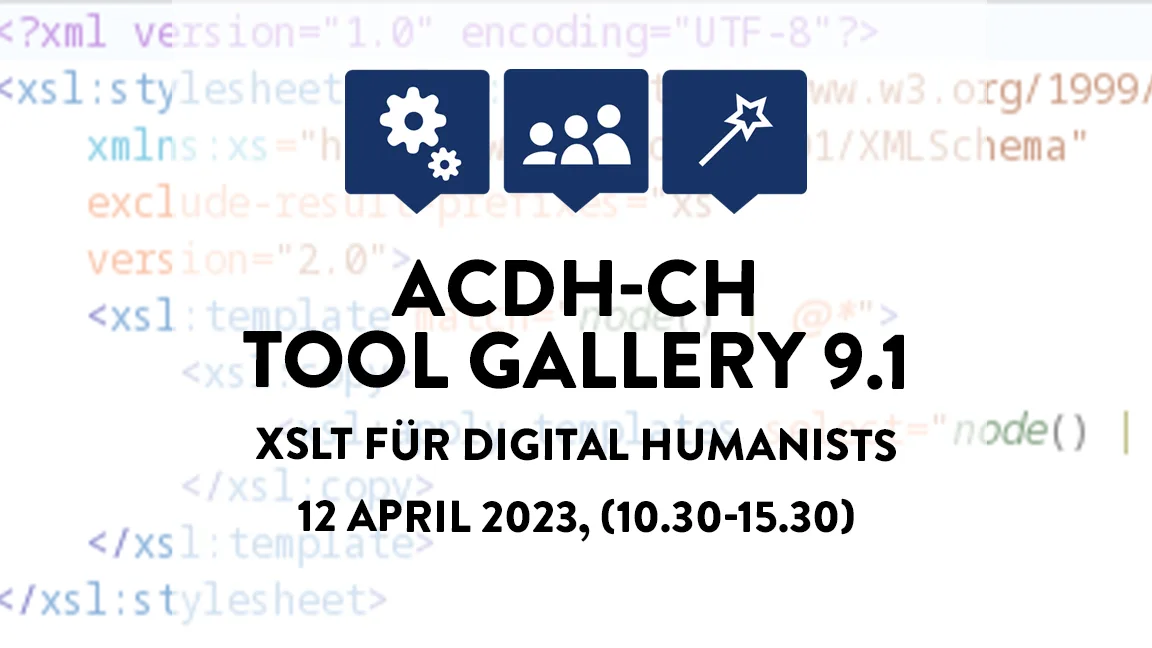
ACDH-CH Tool Gallery 9.1 - XSLT für Digital Humanists
When: Wednesday, April 12, 2023
Where: Alte Burse, Sonnenfelsgasse 19, 1010 Vienna
Registration: Please register via this link before March 8.
Please note that the number of participants is limited to 15 people.
Language: German
We are pleased to welcome Christian Steiner and Christopher Pollin as speakers who will introduce you to XSLT in the Digital Humanities.
XSL (Extensible Stylesheet Language) and X-technologies are well established technologies in the digital humanities as a lot of data is available in XML: the standard of the Text Encoding Initiative (TEI) is based on XML as well as many metadata standards for the description, administration and long-term archiving of data that focus on XML. Many systems offer the option of using XML as an import or export format, and XML is usually the basic format for the web frontend required to implement digital editions.
In the course of the workshop, which will be held onsite only and in German language, an introduction to the programming language XSL will be given. The following learning objectives are targeted:
-
Setting up an (XSL)-transformation scenario in Oxygen XML Editor
-
Setting up and implementing an XSL transformation from XML/TEI to HTML (with Bootstrap 5)
-
Get to know and apply simple XPath expressions
-
Get to know and apply the following program structures in XSL:
- xsl:apply-templates
- xsl:call-template
- xsl:if und xsl:choose
- XPath Operators
- XPath functions and XSLT-specific additions to XPath
- format-date(), substring-after(), concat(), sum(), document() etc.
- xsl:for-each, xsl:for-each-group
- xsl:result-document
The workshop is planned in the sense of blended learning. Input is provided via screencasts and the classroom session focuses on hands-on exercises. The focus is on a very pragmatic approach. The main goal is not to convey theoretical concepts, but to provide an introduction to simple transformation scenarios with XSL.
PREREQUISITES AND BACKGROUND KNOWLEDGE:
A good knowledge of TEI is necessary for participation in the workshop. You must bring your own laptop with Oxygen installed. You can obtain a 30-day trial licence here .
Prepare for the workshop with the following materials:
Screencast series Introduction to XSLT on Youtube
Einführung in XSLT. Zur kleinen, statischen, digitalen Edition. Teil 1
Einführung in XSLT. Zur kleinen, statischen, digitalen Edition. Teil 2
Einführung in XSLT. Zur kleinen, statischen, digitalen Edition. Teil 3
Einführung in XSLT. Zur kleinen, statischen, digitalen Edition. Teil 4
Einführung in XSLT. Zur kleinen, statischen, digitalen Edition. Teil 5
Einführung in XSLT. Zur kleinen, statischen, digitalen Edition. Teil 6
Other Material:
GitHub Folder: https://github.com/chpollin/Teaching/tree/master/TTT/TTT_6_XSLT
LIMITED NUMBER OF PARTICIPANTS: 15 PERSONS
PROGRAMME: 12. APRIL; 10:30 A.M. – 3:30 P.M.
10:30 -11:00 – Registration and Coffee
11:00 – 13:00 – Part 1
13:00 – 13:30 – Lunch Break (Catering)
13:30 – 15:30 – Part 2
PRESENTERS:
Christian Steiner
Christian Steiner has a Master’s degree in Translation (German/English/Bosnian/Croatian/Serbian) and a Master’s degree in Digital Humanities. Since 2012 he has been a research associate at the Centre for Information Modelling (ZIM) at the University of Graz. His work includes data modelling and data processing as well as application development in various DH projects. The focus of his work is on Semantic Web technologies, Linked Data and web programming. In addition to his teaching in these areas, his dissertation project deals with Linked Data and the potential of Wikidata as a hub between the life sciences and the humanities. Together with Christopher Pollin, he founded the company Digital Humanities Craft in 2022.
Christopher Pollin
Christopher Pollin has a Master’s degree in History and a Joint Master’s degree in Digital Cultural Heritage. He is currently a PhD student in Digital Humanities. Since 2016, he has been working in various positions at the Centre for Information Modelling (ZIM) at the University of Graz. His work includes technical development and data modelling in various projects such as Stefan Zweig digital, Open Access Database Adjective-Adverb Interfaces in Romance or Digital Edition Publishing Cooperative for Historical Accounts. His work focuses on semantic web, information visualisation, digital edition, resource discovery and web programming. In addition to his teaching in these areas, his dissertation project deals with ontology-based resource discovery for historical information using historical financial records as an example. He is, together with Christian Steiner, one of the co-founders of Digital Humanities Craft.